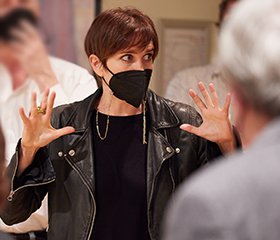Why did Tyne Rafaeli want to direct Brian Watkins’ new play Epiphany, which opened last week at LCT’s Newhouse space? In a recent conversation, she answered, “Firstly, there is Brian’s virtuosic ability with language, Epiphany reads like an exquisite piece of music and it made me howl with laughter and then stopped me dead in my tracks. Secondly, this play plunges a needle right into the most urgent questions about how we are living in this 21st Century moment. It explores our need to gather, our need for ritual and our need for communion. This was a pressing reality when Brian wrote the play before the pandemic, and of course these questions have only become more profound and acute as we try to make sense of our “post pandemic” world.”
The play, which is centered around a dinner party hosted by a character called Morkan (Marylouise Burke), may reflect large pandemic-era themes but directing the drama involved more specific and practical concerns. Rafaeli, who most recently at LCT directed Sylvia Khoury’s Power Strip, explained: “We began rehearsing during the most recent Covid wave. We wanted to protect everyone’s well-being so actors were in masks during the last ten days of the rehearsal room, and it denied us a level of intimacy that this play so desperately needs.”
She continued: “Our process making theater is about intimacy. And this play is about nine people who give their phones away in the hope of that intimacy. When we were finally able to take our masks off and see and touch each other the play took on an even greater power. What was a significant obstacle in the creative process became a strange gift or lesson for us about how to play the play.
Rafaeli is aware of what actors need in part because she herself used to be one. Reared in London by an American mother and a father who had been born in the Middle East, Rafaeli was a serious child gymnast training in London and Moscow but turned to acting after an injury. “I was very happy in the rehearsal room but couldn’t find that same fulfilment in performance. However, acting is absolutely the foundation for my becoming a director.”
Rafaeli did a graduate program in directing at Columbia, where she met Bartlett Sher, resident director at LCT. “The way Bart spoke about his work resonated deeply with me. We began a conversation about what it is to do this work – now - in America - in relationship to the world around us. Those conversations between us continue to this day.”
At LCT, Rafaeli was Sher’s associate on Golden Boy and The King and I and many others on both sides of the Atlantic. Like Sher, she likes working on a variety of projects, an inclination reflected in her career during the past decade. In New York, she has done acclaimed productions of Ming Peiffer’s Usual Girls and Craig Lucas’ I Was Most Alive With You and Sylvia Khoury’s Selling Kabul. “That project happened soon after the U.S. withdrew from Afghanistan,” Rafaeli explained.
“My mom was a news journalist so I was raised by an investigative mind in constant conversation with the world at large. I am drawn to stories that tap into something about how we are living now and that ask complex and fearless questions.”
What does Epiphany ask us? Rafaeli answered: “In this moment of great confusion, loss and disorientation this play offers an entertaining, funny, moving and sophisticated look at how we live together in the 21st Century. This play is an act of communion, a ritual, a necessary coming together after over two years of extreme isolation and atomization. As the character played by Marylouise Burke says, ‘The world is so wobbly. I’ve lived in the same house for 40 years and I still feel dislocated. I feel like an exile.’”
The exile theme comes in part from Watkins’ primary literary inspiration for Epiphany – the short story “The Dead,” by the Irish expat author James Joyce. And in fact the first production of Epiphany took place in Ireland: at the Town Hall Theatre in Galway, in 2019.
“When I first read the play,” Rafaeli said, “I hadn’t yet spoken to Brian about Joyce, and I thought: This is a play for 21st-century America. Our production has American actors so even though the magic of the writing makes the work adaptable to many cultural contexts here it feels very American in its spirit.” She added: “And it feels very 2022. It is my job through theater to help all of us make sense of the world we’re living in. That is a very great privilege – and I don’t use that word lightly.”
Brendan Lemon is the editor of lemonwade.com
